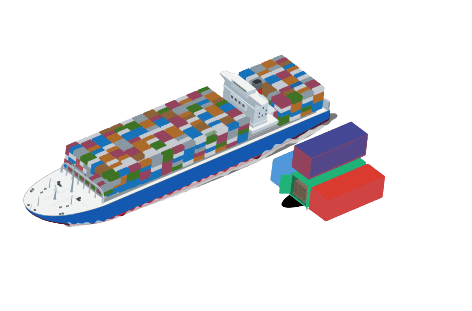Currently, the internationalization of companies becomes an increasingly attractive reality for various Brazilian business branches, as entrepreneurs seek to expand their operations to countries with strong currencies.
Therefore, the indexers of international freight of the moved products, are now considered a central issue, which should be well planned and executed with caution.
Knowing how to choose the most appropriate modal, for example, is essential for increasing sales, also avoiding large losses.
In this article you will understand the entire process of freight composition, from how the process works with costs and tariffs to how to pay and what measures are being taken regarding the tools that make up an average of the freight amount charged to move the goods. Good reading!
What is international shipping and how to choose the right choice?
Freight is the amount paid for the use or rental of a means of transport. International freight is a fundamental operation for foreign trade, as it executes the movement of goods between countries, through an international contract previously established.
In this way, it is necessary to make a planning for the choice of the appropriate freight in view of your needs, taking into account for the calculation of the same some points, which are:
- place of origin and destination;
- delivery time;
- characteristics of the load;
- availability for shipping;
- modal that will be used;
- service cost
It may not seem like it, but some of these points also influence freight indexers. However, we will talk about this later. Now we will continue learning.
How does the international freight process work?
For a simplified understanding of this complex process of foreign trade, we can say that the beginning of everything takes place in the exporter’s warehouse. Then, the negotiation and confirmation of the international sale is made and thus the logistics operations begin, from the internal displacement to the chosen modal, through the work performed by the customs broker.
Later, after dispatch, all cargo will be routed to a customs enclosure, which is divided into primary zones and secondary zones, so that some procedures are carried out, before the allocation of the load in the modal.
Incoterms: international freight responsibility
Just as shippers and carriers point freight indexers as important tools, incoterms are also not left behind, because at the time of the composition of the freight value, they define the duties and obligations of importers and exporters.
Incoterms are standards created by the ICC (International Chamber of Commerce), with the intention of improving communication between countries, so that conflicts in trade relations are avoided, as they will regulate the obligations and rights of both parties.
Thus, one should choose the best for the operation, in the light of the costs involved in the international transport of cargo.
What are the main costs of international shipping?
One of the objectives of the Brazilian government is to create a mechanism for the promotion of freight indexers, reducing the costs of the shipper and improving the gains of vehicle drivers, especially in the road modal.
Below we will mention some of the costs that influence the value of international freight, which are:
- POL (Port of Loading) – Port of embarkation;
- Comm (Commodity) – commodity;
- TT (Transit Time) – Transit time;
- Storage at CFS (Container Freight Station) – Storage in the port.
Rates to consider in international freight quotation
At this time, one should pay close to local rates, as well as capatazia rate, release of BL (Bill of Loading), ISPS (International Security and Port Security and deconsolidation.
In addition, there will be indirect costs, which are paid by the importer, such as storage and the Siscomex fee, among others that operations can generate.
How to pay for international shipping?
Freight payments can be made in three ways. First, we can mention the prepaid freight (freight prepaid), which is carried out immediately to the shipment of the goods, for the withdrawal of the knowledge of shipment.
Then we have freight collect, which is the freight that can be paid anywhere in the world. Finally, we also have freight payable at destination, which means that the importer will pay the same on arrival or pick-up of the goods.
Freight value indexation considerations
For some time, the Brazilian government has been considering the possibility of creating a mechanism to index the value of freight paid in the road modal. Since, we know that road transport flows all the production stored in ports, as well as moves more than 60% of the goods along Brazilian and international highways or roads.
In addition, it facilitates the delivery of the goods, between the origin and destination on the route, to the last mile to more distant regions.
This mechanism has the main objective of paying the fair value for the cost of freight, that is, the price of the diesel of the day on arrival at the destination, being passed on to the carrier with the increase that arises.
Freight indexers will be inserted, taking into account a commercial practicein which the contracts of transport in all modals, provide for the application of a surcharge proportional to changes in fuel prices (Full Surcharge).
The idea is that the cost of fuel, in whose variation is considered an extreme factor in the formation of freight contracts prices, should be diluted along the chain, in order to preserve the margins of the service provided.
As a rule, it would not only be valid for the transfer of the increase to the final consumer, but also in cases of price reduction, the due discounts should be applied.

